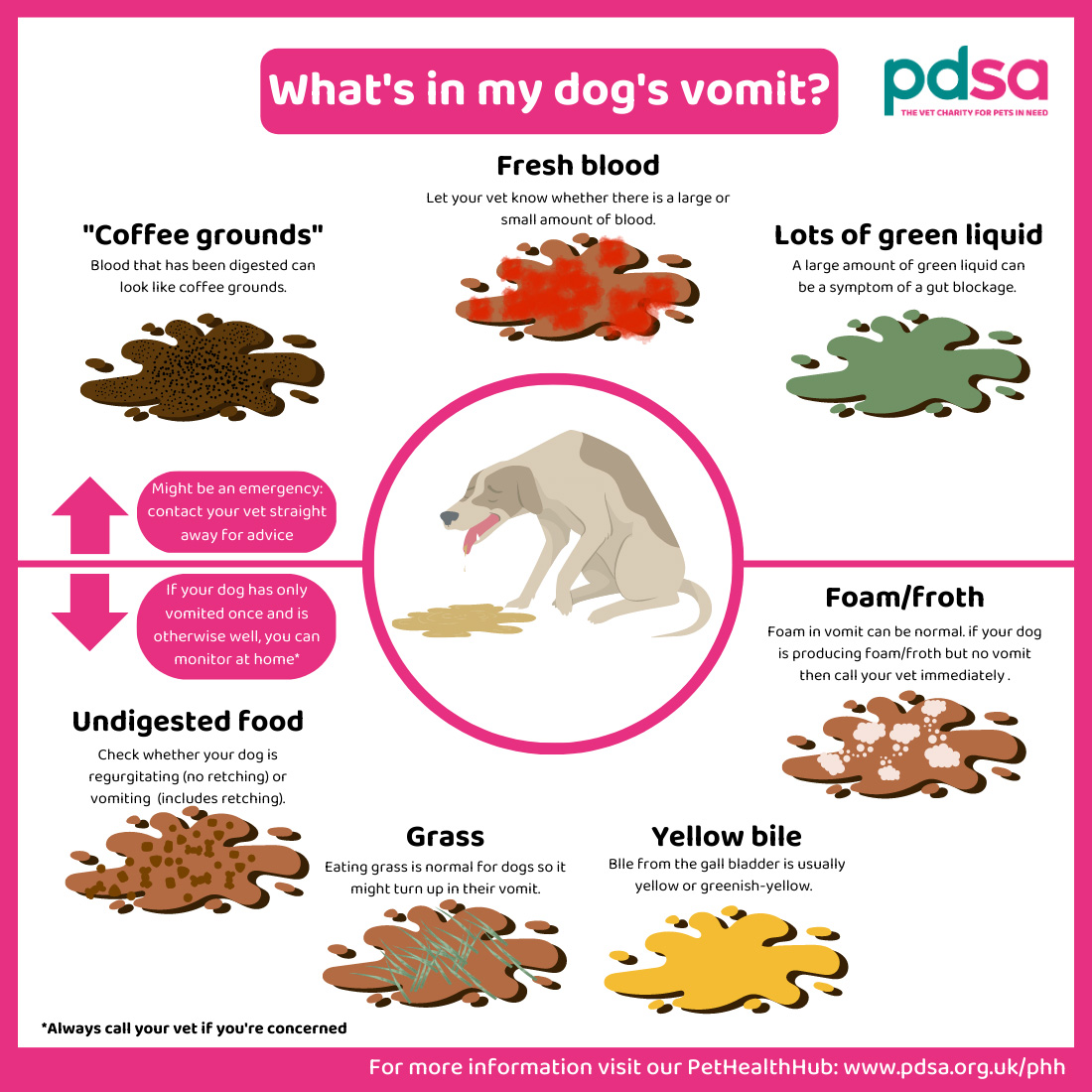Dog Vomiting
Overview
- Vomiting is a common problem in dogs that can be caused by many different things, some minor, some very serious.
- Vomiting is different to retching and regurgitation, and all three are caused by different things so it’s important to know the difference.
- It’s not always necessary to see your vet if your dog has vomited once, especially if they seem fine in themselves. However, you’ll need to monitor them closely and call your vet for advice if they vomit again, seem unwell or develop any other symptoms.
- Contact your vet immediately if your dog is repeatedly trying to vomit but not bringing anything up (retching) especially if they have a bloated tummy, as these are symptoms of a twisted stomach/GDV.
 Video found at youtu.be/HRGdUVJp0KQ
Video found at youtu.be/HRGdUVJp0KQ
Signs your dog is feeling nauseous (sick)
Dogs that are feeling nauseous (sick) often show the following signs:
- Lip licking and swallowing
- Dribbling more than usual
- Restlessness and pacing
- A reduced appetite
The difference between vomiting, retching and regurgitating
Vomiting, retching and regurgitation are all slightly different and are caused by different things, so being able to tell them apart is important.
Retching
Retching is when a dog gags and strains as if they are going to be sick, but then brings very little up. A single retch is nothing to worry about, but you should contact your vet immediately if your dog is retching continuously, especially if they have a bloated stomach as this can be a sign of a life-threatening condition called a twisted stomach (GDV).
Regurgitation
Regurgitation is when a dog brings up undigested food, with no retching or signs of feeling sick. Regurgitation usually happens quite soon after eating, and as a one-off can simply mean your dog has eaten too fast. However, some health conditions also cause regurgitation so if it happens regularly, or you’re worried, you should make an appointment to see your vet.
Vomiting
Vomiting is when a dog shows signs of nausea (feeling sick), retches and is sick.
When to contact your vet
It’s not always necessary to see your vet the first time your dog throws up, but you’ll need to monitor them closely and call your vet for advice if they vomit more than once, seem unwell, or develop any of the symptoms below:
- Retching (trying to vomit but not bringing anything up)
- Low energy (lethargy)
- A bloated tummy
- A painful abdomen
- Vomiting for more than 24 hours
- Vomiting constantly with no breaks
- Vomiting and is very young or very old
- Vomiting and is otherwise unwell/has other illness
- Blood in their vomit
- Signs of dehydration (sticky gums or sunken eyes)
- Disorientation or collapse
You know your dog best – if you are concerned, contact your vet.
Caring for a dog who has vomited
If your dog has only vomited once and seems otherwise well, you may decide to wait and see if they vomit again before taking them to the vets. Here are a few things you can try at home during that time.
Starve them for a short amount of time
A short period without food (12 - 24 hours) can sometimes help but make sure they are still drinking water.
Give them small, regular bland meals
Give your dog small, regular, bland meals throughout the day. Bland diets are available in tins (contact your vet for more information), or alternatively you can give them plain boiled rice with chicken breast, white fish or low-fat cottage cheese. Don’t give your dog anything rich or fatty – this could make things much worse! Once your dog has stopped vomiting you can slowly start to re-introduce their normal food again.
Make sure they drink plenty of water
To prevent dehydration your dog will need to drink more than usual to replace what they’ve lost in their vomit. Provide plenty of fresh water and make sure your dog is drinking little and often throughout the day. Speak to your vet if you are worried about the amount your dog is drinking.
Let them rest
While your dog is feeling poorly, it’s unlikely that they will want to do anything energetic so it’s a good idea to let them rest and recover for a couple of days.
Causes of vomiting in dogs
Vomiting is a common problem in dogs. Fortunately, most cases are caused by something minor that resolves itself in less than 24 hours, but some are much more serious and require veterinary treatment. Some of the conditions that can cause vomiting in dogs include:
Gut problems
- Gastritis (inflammation of the stomach)
- Gastroenteritis (inflammation of the stomach and guts)
- Haemorrhagic gastroenteritis (HGE)
- Parvovirus and other gut infections
- Eating something harmful
- A gut blockage
- Twisted stomach (GDV)
- Worms (most common in puppies)
- Gut ulcers (rare)
Other causes
What’s in my dog’s vomit?
Vomit can contain:
- Bile (stomach acid) - this is usually green or yellow and often foamy.
- Blood - which can be red, black, brown or, if it’s partially digested, might look like coffee grounds. Contact your vet immediately if you notice blood in your dog’s vomit.
- Food – can be undigested or digested and any colour (often brown).

Published: February 2023
Did you find this page useful?
Tell us more
Please note, our vets and nurses are unable to respond to questions via this form. If you are concerned about your pet’s health, please contact your vet directly.
Thank you for your feedback
Want to hear more about PDSA and get pet care tips from our vet experts?
Sign up to our e-newsletter
Written by vets and vet nurses. This advice is for UK pets only. Illustrations by Samantha Elmhurst.

